7 SEPTEMBER 2009
YOUR WORDS
Readers are invited to add their comments to any story. Click on the article to see and add.
BTN DISTRIBUTION
BTN also goes out by email every Sunday night at midnight (UK time). To view this edition click here.
- ON THE SOAPBOX : Peter Davies is Managing Director of regional airline Air Southwest
- Airbus milestone
- Austrian to become German
- BA
- Bendy buses going
- bmi changes
- Boeing management changes
- Bombardier C Series update
- Delta goes flat at Heathrow
- Dubai Metro sets date
- easyJet still at Luton
- Etihad upgrades
- Gatwick to Madrid
- In-flight internet
- Kiev gets new 5-star hotel
- London City Aircraft delivered
- San Francisco Airport hotel
- SkyEurope grounded
- Southwest copies the Brits
- United Airlines money move
- Virgin closes clubhouse
- GLORIOUS GOODWOOD: 18-20 September
- ON TOUR: The Road to Morocco
- HAPPY TALK: Read the papers first
The Business Travel News
PO Box 758
Edgware HA8 4QF
United Kingdom
info@btnews.co.uk
© 2022 Business Travel News Ltd.
Austrian to become German
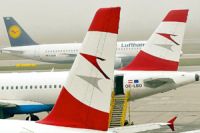 AUSTRIAN AIRLINES is to become part of Lufthansa (LH) “sometime in September” following the European Commission finally approving LH bid for the loss making carrier. Certain conditions have been met including service reductions and the giving up of slots on routes from Vienna to Brussels, Cologne, Frankfurt, Munich and Stuttgart, although under the present economic conditions this is unlikely to have much effect. €500m of so-called “restructuring assistance” from the Austrian government is involved. LH says it plans to operate Austrian as an independent subsidiary as part of its strategy of becoming a "system of independent airlines" with multiple European power bases, a sister company to Swiss. www.aua.com
AUSTRIAN AIRLINES is to become part of Lufthansa (LH) “sometime in September” following the European Commission finally approving LH bid for the loss making carrier. Certain conditions have been met including service reductions and the giving up of slots on routes from Vienna to Brussels, Cologne, Frankfurt, Munich and Stuttgart, although under the present economic conditions this is unlikely to have much effect. €500m of so-called “restructuring assistance” from the Austrian government is involved. LH says it plans to operate Austrian as an independent subsidiary as part of its strategy of becoming a "system of independent airlines" with multiple European power bases, a sister company to Swiss. www.aua.com
bmi changes
 BMI has implemented its first changes since the take-over by Lufthansa just one month ago. Out go Peter Spencer, Managing Director Mainline and also Commercial Director, Martyn Bridger. Spencer’s role is taken over by Dominic Paul, who was Commercial Director at Go before its takeover by easyJet. For the bmi Group Nigel Turner remains as Managing Director with Tim Bye as his deputy, both based at Donnington Hall, East Midlands. www.flybmi.com
BMI has implemented its first changes since the take-over by Lufthansa just one month ago. Out go Peter Spencer, Managing Director Mainline and also Commercial Director, Martyn Bridger. Spencer’s role is taken over by Dominic Paul, who was Commercial Director at Go before its takeover by easyJet. For the bmi Group Nigel Turner remains as Managing Director with Tim Bye as his deputy, both based at Donnington Hall, East Midlands. www.flybmi.com
Delta goes flat at Heathrow
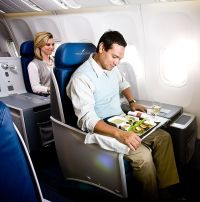 DELTA AIR LINES has launched its new BusinessElite class on all services out of Heathrow to Atlanta, New York JFK and Detroit. Operating Boeing 767-400 the much improved cabin features a 77-82 inch, 180-degree full-flat beds in a one-two-one configuration, the new seat gives every passenger in the cabin direct aisle access as well as a choice of single seats for added privacy. The novel layout has been designed in such a way to give the single window seat customers even more table space by alternating the actual seats (see picture). Heathrow to Minneapolis will be added by September 2009. Amongst other enhancements BusinessElite now includes full-size pillows, quilted duvet comforters and new dinnerware. Also upgraded is the Delta on Demand digital entertainment system which has also been extended to Economy Class. www.delta.com
DELTA AIR LINES has launched its new BusinessElite class on all services out of Heathrow to Atlanta, New York JFK and Detroit. Operating Boeing 767-400 the much improved cabin features a 77-82 inch, 180-degree full-flat beds in a one-two-one configuration, the new seat gives every passenger in the cabin direct aisle access as well as a choice of single seats for added privacy. The novel layout has been designed in such a way to give the single window seat customers even more table space by alternating the actual seats (see picture). Heathrow to Minneapolis will be added by September 2009. Amongst other enhancements BusinessElite now includes full-size pillows, quilted duvet comforters and new dinnerware. Also upgraded is the Delta on Demand digital entertainment system which has also been extended to Economy Class. www.delta.com
Etihad upgrades
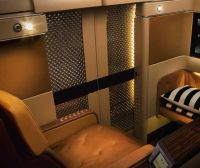 ETIHAD, the State airline of Abu Dhabi, has not only upgraded its executive lounge at Heathrow, but has also introduced the first of its highly-anticipated new First Class suites on to the Airbus A340-600 route between London and the Emirates. A second aircraft joins the fleet later this month and the product will also be provided on a further five Airbus A330-300s progressively being delivered. The airline will also retrofit nine Airbus A340 aircraft that are currently in service by December 2010. The state-of-the-art suite provides First Class customers with a private cabin including an 80.5” flat bed. Within the First Class cabin there is also a large and luxurious changing room with a full length mirror, wash basin and leather fold-down seat allowing customers to freshen up at any time during the flight. The new Heathrow lounge will open when the airline moves from T3 to T4 on 30 September. www.etihadairways.com
ETIHAD, the State airline of Abu Dhabi, has not only upgraded its executive lounge at Heathrow, but has also introduced the first of its highly-anticipated new First Class suites on to the Airbus A340-600 route between London and the Emirates. A second aircraft joins the fleet later this month and the product will also be provided on a further five Airbus A330-300s progressively being delivered. The airline will also retrofit nine Airbus A340 aircraft that are currently in service by December 2010. The state-of-the-art suite provides First Class customers with a private cabin including an 80.5” flat bed. Within the First Class cabin there is also a large and luxurious changing room with a full length mirror, wash basin and leather fold-down seat allowing customers to freshen up at any time during the flight. The new Heathrow lounge will open when the airline moves from T3 to T4 on 30 September. www.etihadairways.com
Kiev gets new 5-star hotel
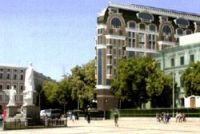 KIEV now has an InterContinental hotel following the opening of a 272-guestroom property in the Ukraine capital last week. Situated in the heart of the city the 11-storey hotel offers five Ambassador Suites and two Signature Suites - a 212-sq-metre Royal Suite and larger 314-sq-metre Presidential Suite, both overlooking St Michael's Square. The Presidential Suite has enhanced security features with exclusive private lift access, and has been specifically designed to host visiting heads of state and high-level dignitaries. All guestrooms and suites are classical in style and are equipped with the latest business and entertainment technology including high speed wireless internet access, Philips plasma tvs and iPod docking stations, and Cisco IP telephones. The InterContinental Kiev is also home to the capital city's largest and most technologically advanced pillarless Grand Ballroom, for receptions of up to 450 guests. The hotel also has a state-of-the-art conference centre, a spa and health club plus indoor swimming pool. www.ichotelsgroup.com/intercontinental
KIEV now has an InterContinental hotel following the opening of a 272-guestroom property in the Ukraine capital last week. Situated in the heart of the city the 11-storey hotel offers five Ambassador Suites and two Signature Suites - a 212-sq-metre Royal Suite and larger 314-sq-metre Presidential Suite, both overlooking St Michael's Square. The Presidential Suite has enhanced security features with exclusive private lift access, and has been specifically designed to host visiting heads of state and high-level dignitaries. All guestrooms and suites are classical in style and are equipped with the latest business and entertainment technology including high speed wireless internet access, Philips plasma tvs and iPod docking stations, and Cisco IP telephones. The InterContinental Kiev is also home to the capital city's largest and most technologically advanced pillarless Grand Ballroom, for receptions of up to 450 guests. The hotel also has a state-of-the-art conference centre, a spa and health club plus indoor swimming pool. www.ichotelsgroup.com/intercontinental
SkyEurope grounded
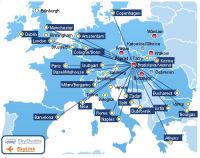 SKYEUROPE, the Bratislava (Slovakia) based low cost carrier, has filed for bankruptcy following months of concern as to its financial situation. In June the airline went into administration having been granted protection from its creditors. According to an announcement by the Vienna Bourse (stock exchange), the trustee of SkyEurope has filed to open proceedings due to the airline having insufficient funds to continue operating. With regard to the UK the airline flew into Luton and Manchester. The SkyEurope website confirms the position and states that passengers who have paid direct for their seats are unlikely to get their money back. www.skyeurope.com
SKYEUROPE, the Bratislava (Slovakia) based low cost carrier, has filed for bankruptcy following months of concern as to its financial situation. In June the airline went into administration having been granted protection from its creditors. According to an announcement by the Vienna Bourse (stock exchange), the trustee of SkyEurope has filed to open proceedings due to the airline having insufficient funds to continue operating. With regard to the UK the airline flew into Luton and Manchester. The SkyEurope website confirms the position and states that passengers who have paid direct for their seats are unlikely to get their money back. www.skyeurope.com
Virgin closes clubhouse
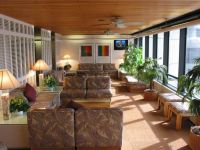 VIRGIN ATLANTIC (VS) is to close its Gatwick Clubhouse temporarily from 1 September until the end of November. When it re-opens later in the year passengers will be provided with the ultimate pre-flight pampering experience, complete with a brand new Cowshed Spa. Cowshed is the Soho House spa brand where VS Upper Class and Gold Card passengers are able to treat themselves to a selection of exclusive treatments. During closure of the Gatwick facility eligible passengers will be offered alternative lounges at Gatwick Airport, including the use of the Virgin Holidays V-Room. Virgin Atlantic currently flies from Gatwick to Antigua, Barbados, Grenada, Havana, Kingston, Las Vegas, Montego Bay, Orlando, St Lucia, Tobago and, from 7 November, to Puerto Rico. www.virgin-atlantic.com
VIRGIN ATLANTIC (VS) is to close its Gatwick Clubhouse temporarily from 1 September until the end of November. When it re-opens later in the year passengers will be provided with the ultimate pre-flight pampering experience, complete with a brand new Cowshed Spa. Cowshed is the Soho House spa brand where VS Upper Class and Gold Card passengers are able to treat themselves to a selection of exclusive treatments. During closure of the Gatwick facility eligible passengers will be offered alternative lounges at Gatwick Airport, including the use of the Virgin Holidays V-Room. Virgin Atlantic currently flies from Gatwick to Antigua, Barbados, Grenada, Havana, Kingston, Las Vegas, Montego Bay, Orlando, St Lucia, Tobago and, from 7 November, to Puerto Rico. www.virgin-atlantic.com
HAPPY TALK: Read the papers first
The shipwrecked mariner had spent a number of years on a deserted island. Then one morning he was thrilled to see a ship offshore and a smaller vessel pulling out toward him. When the boat grounded on the beach, the officer in charge handed the marooned sailor a bundle of newspapers and told him, "Read through these and let us know if you still want to be rescued."
ON THE SOAPBOX : Peter Davies is Managing Director of regional airline Air Southwest
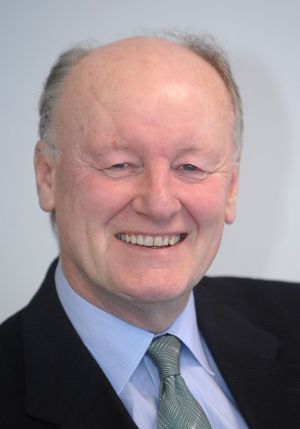 Peter Davies is Managing Director of regional airline Air Southwest. (www.airsouthwest.com), based in Plymouth (England) which is wholly owned by the Sutton Harbour Group, a transport and regeneration company listed on the London Stock Exchange. Peter joined Air Southwest in February this year from Caribbean Airlines in the West Indies where he was Chief Executive and has nearly 30 years’ experience in aviation including Chief Executive of SN Brussels Airlines. He also held senior posts with DHL Express Systems in the UK, Belgium and North America for 12 years.
Peter Davies is Managing Director of regional airline Air Southwest. (www.airsouthwest.com), based in Plymouth (England) which is wholly owned by the Sutton Harbour Group, a transport and regeneration company listed on the London Stock Exchange. Peter joined Air Southwest in February this year from Caribbean Airlines in the West Indies where he was Chief Executive and has nearly 30 years’ experience in aviation including Chief Executive of SN Brussels Airlines. He also held senior posts with DHL Express Systems in the UK, Belgium and North America for 12 years.
Judging by the recent crop of headlines you could be forgiven for thinking that regional air travel was dead and buried.
As I write easyJet has just culled 360 flights a week from Luton and East Midlands, blaming high costs at Luton and lack of growth at East Midlands, choosing instead to deploy its aircraft to more lucrative European routes.
That followed Ryanair’s announcement of a 30% winter reduction at Stansted and an almost complete withdrawal from Manchester, again citing high charges, but tempered by an announcement of expansion at Leeds Bradford.
Then came the collapse of Slovakian SkyEurope – which flew from Luton and Manchester in the UK – sparking a tussle for market share, and just days later figures from IATA showed global airline losses of more than £3.7bn in the first half of the year.
All that makes pretty grim reading and it is tough out there, but just because it’s tough doesn’t mean that you can’t manage through a difficult period.
And the more negative we become, the more we risk imbuing our customers with the same sense of doom and gloom to the point that they begin to regard air travel as a miserable experience just because we keep carping on about what a miserable time we’re all having.
What we should be doing is fighting our corner, enhancing the customer experience and – rather than treat them as cattle in the relentless drive to cut costs – actually treat them with respect.
That’s exactly our strategy at Air Southwest. We’re a young airline – six years old next month, and we’re a niche airline, but above all we’re a customer focused airline with a network that is structured first and foremost around their needs.
The South West of England is not easily connected to other areas of the UK because of its geography so what our passengers demand are fast and efficient links, many of which are time-critical business services.
We have innovated by introducing a 20-minute check-in at Plymouth, Newquay and London City Airport, introduced a flexible premium package aimed at business travellers and we have been aggressively promoting our services in competition with the rail network.
Key to this was the introduction in April of a twice daily service to London City Airport from Plymouth and Newquay. The flight time from Plymouth – which operates as a direct service in both directions – is just 70 minutes. Combined with speedy check-in and fast transit through London City, we shave four hours off an average day return journey.
That’s an enormous saving when you’re marketing to business customers and we’re seeing more people abandon the train in favour of air.
Our transparent pricing policy has also contributed to our success. Too many airlines, for far too long, have insulted the intelligence of their customers through a pricing regime that aggregates a raft of hidden charges to the point that the final fare they are charged bears absolutely no resemblance to that advertised.
It’s a shoddy practice that antagonises customers and does nothing to improve the image of air travel. That’s why we introduced a ‘Fares Fair’ policy to tell customers exactly what they’ll pay from the outset, with none of those hidden extras that appear at the last minute. The feedback has been very positive.
Our industry has also done itself few favours when it comes to promoting its environmental credentials, especially in relation to regional air travel. For too long the environmental lobby has used us as the whipping boy for climate change because we’re an easy target.
At Air Southwest we’ve gone to great lengths to educate our customers so that they can put all these claims into context and make an informed choice.
This includes information on comparative emissions from other sectors (like road transport and industry, for example), and comparisons per passenger mile for comparable journeys by car and train.
In fact our Dash 8-300s achieve around 70 miles per gallon per passenger and because our aircraft typically fly at 14,000 feet we’re well below the altitude where emissions can have a multiplier effect.
Many of our customers have expressed surprise at the favourable environmental performance of our aircraft when compared with alternative forms of transport, so it falls to all of us to try and put the environmental arguments into perspective.
I’m proud of what Air Southwest has achieved. Sure, it’s a tough market and I wouldn’t pretend otherwise, but reports of the death of regional air travel are very much mistaken.
PETER DAVIES
Managing Director
Air Southwest
BA
 BRITISH AIRWAYS seems to be continuing in it policy of “dumbing down” on what it offers its customers, although the latest measure will have little effect on the majority of passengers. For bookings from 7 October, Economy Class passengers can check in just one bag, weighing up to 23kg, free of charge. Additional bags will be charged from £35 minimum a piece at the check-in desk. For those travelling with skis or a snowboard, the cost will be £56 return if you pay online, or from £70 at the airport. Gold and Silver card holders gain certain benefits. By contrast Virgin allows for two bags up to the 23kg maximum but then charges £90 for a third bag if it all comes to more than the cut off point. Both airlines websites need to be carefully looked at but our recommendation is “travel light”. www.ba.com www.virgin-atlantic.com
BRITISH AIRWAYS seems to be continuing in it policy of “dumbing down” on what it offers its customers, although the latest measure will have little effect on the majority of passengers. For bookings from 7 October, Economy Class passengers can check in just one bag, weighing up to 23kg, free of charge. Additional bags will be charged from £35 minimum a piece at the check-in desk. For those travelling with skis or a snowboard, the cost will be £56 return if you pay online, or from £70 at the airport. Gold and Silver card holders gain certain benefits. By contrast Virgin allows for two bags up to the 23kg maximum but then charges £90 for a third bag if it all comes to more than the cut off point. Both airlines websites need to be carefully looked at but our recommendation is “travel light”. www.ba.com www.virgin-atlantic.com
Boeing management changes
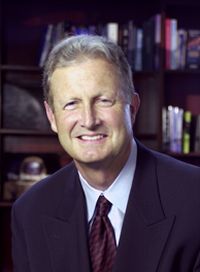 BOEING COMMERCIAL AIRPLANES President and CEO Scott Carson is to retire from the company at the year end. His is succeeded with immediate effect by Jim Albaugh, President and CEO Boeing Integrated Defense Systems (see AERBT). Carson (63) was appointed CEO in September 2006, succeeding Alan Mulally, who left to become CEO of Ford Motor Co. Carson led the technically successfully but financially doomed Boeing “Connexion” in-flight internet project before becoming effectively Boeing’s chief salesman as VP-Sales in December 2004 and was further promoted in 2006. He proved to be a robust opponent to Airbus John Leahy. It is unlikely he was fully aware of the difficulties the 787 had in store, nor the extent of Boeing’s industrial problems. Albaugh joined Boeing in 1996 with the acquisition of Rockwell. He has led Boeing's defence, space and associated services businesses since 2002 seeing it grow from $25bn to an expected $34bn in 2009. www.boeing.com/commercial
BOEING COMMERCIAL AIRPLANES President and CEO Scott Carson is to retire from the company at the year end. His is succeeded with immediate effect by Jim Albaugh, President and CEO Boeing Integrated Defense Systems (see AERBT). Carson (63) was appointed CEO in September 2006, succeeding Alan Mulally, who left to become CEO of Ford Motor Co. Carson led the technically successfully but financially doomed Boeing “Connexion” in-flight internet project before becoming effectively Boeing’s chief salesman as VP-Sales in December 2004 and was further promoted in 2006. He proved to be a robust opponent to Airbus John Leahy. It is unlikely he was fully aware of the difficulties the 787 had in store, nor the extent of Boeing’s industrial problems. Albaugh joined Boeing in 1996 with the acquisition of Rockwell. He has led Boeing's defence, space and associated services businesses since 2002 seeing it grow from $25bn to an expected $34bn in 2009. www.boeing.com/commercial
Dubai Metro sets date
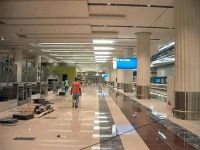 DUBAI’S initial metro line is set to be officially opened by HH Sheikh Mohammed bin Rashid Al Maktoum, Vice-President and Prime Minister of the UAE and Ruler of Dubai, on Wednesday 9 September. It is a significant step forward for the city-state and should dramatically reduce traffic congestion particularly at the airport. Called the Red Line it will initially link ten stations namely: Rashidiya, Terminal 3 (Dubai International Airport), City Center, Al Rigga, Union, Khalid bin Al Waleed, Jafliah, Financial Center, Mall of the Emirates, and Nakheel Harbour & Tower. The remaining stations on the Red Line will be opened in phases over the next few months. The whole US$7.2bn project has taken four years. After Ramadan the metro service will run from Saturday to Thursday from 06:00 up to 23:00, while on Friday the metro service will start from 14:00 to 00:00 (midnight). www.dubaimetro.eu
DUBAI’S initial metro line is set to be officially opened by HH Sheikh Mohammed bin Rashid Al Maktoum, Vice-President and Prime Minister of the UAE and Ruler of Dubai, on Wednesday 9 September. It is a significant step forward for the city-state and should dramatically reduce traffic congestion particularly at the airport. Called the Red Line it will initially link ten stations namely: Rashidiya, Terminal 3 (Dubai International Airport), City Center, Al Rigga, Union, Khalid bin Al Waleed, Jafliah, Financial Center, Mall of the Emirates, and Nakheel Harbour & Tower. The remaining stations on the Red Line will be opened in phases over the next few months. The whole US$7.2bn project has taken four years. After Ramadan the metro service will run from Saturday to Thursday from 06:00 up to 23:00, while on Friday the metro service will start from 14:00 to 00:00 (midnight). www.dubaimetro.eu
Gatwick to Madrid
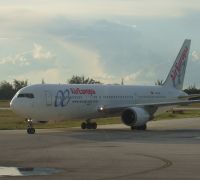 AIR EUROPA, the Spanish airline, is to follow up the successful introduction of twice daily flights from Gatwick to Madrid in spring 2009, with a three times a week service to Salvador de Bahia (Brazil) from 3 November. A Boeing 767 will operate the route, offering a two-class configuration of Economy and Business Class seats. The airline will go daily Buenos Aires, the London services linking at Madrid. The airline is also launching a weekly transatlantic flight between Tenerife North and Miami, securing its position as the only carrier to offer a non-stop service to the US from either of Tenerife’s airports. British Airways will stop its Gatwick to Madrid service on 25 October 2009 leaving easyJet the only competitor on the route. www.aireuropa.com
AIR EUROPA, the Spanish airline, is to follow up the successful introduction of twice daily flights from Gatwick to Madrid in spring 2009, with a three times a week service to Salvador de Bahia (Brazil) from 3 November. A Boeing 767 will operate the route, offering a two-class configuration of Economy and Business Class seats. The airline will go daily Buenos Aires, the London services linking at Madrid. The airline is also launching a weekly transatlantic flight between Tenerife North and Miami, securing its position as the only carrier to offer a non-stop service to the US from either of Tenerife’s airports. British Airways will stop its Gatwick to Madrid service on 25 October 2009 leaving easyJet the only competitor on the route. www.aireuropa.com
London City Aircraft delivered
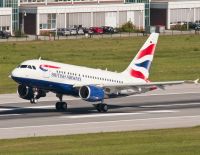 BRITISH AIRWAYS first dedicated Airbus A318 for the controversial London City – JFK route has now been delivered and is being used for training prior to the introduction of daily services on Tuesday 29 September. The aircraft is equipped with the ‘steep approach’ capability required to operate into the dockland airport, although now reduced to 5.5 degrees. It was originally stipulated at 7.5 degrees for noise abatement purposes. The normal glideslope is 3.5 degrees. The new service remains contentious as it will undoubtedly dilute BA’s main line Business Class traffic out of JFK where passengers can change flights if needs be. From City airport passenger loads are likely to be lighter with a longer flight time and the inconvenience of the Shannon stopover. At only 32 seats the service is considered by some a marginal operation with some flights already being discounted for as little as £1,989.60 (inclusive) return. See also British Airways transatlantic gamble www.ba.com
BRITISH AIRWAYS first dedicated Airbus A318 for the controversial London City – JFK route has now been delivered and is being used for training prior to the introduction of daily services on Tuesday 29 September. The aircraft is equipped with the ‘steep approach’ capability required to operate into the dockland airport, although now reduced to 5.5 degrees. It was originally stipulated at 7.5 degrees for noise abatement purposes. The normal glideslope is 3.5 degrees. The new service remains contentious as it will undoubtedly dilute BA’s main line Business Class traffic out of JFK where passengers can change flights if needs be. From City airport passenger loads are likely to be lighter with a longer flight time and the inconvenience of the Shannon stopover. At only 32 seats the service is considered by some a marginal operation with some flights already being discounted for as little as £1,989.60 (inclusive) return. See also British Airways transatlantic gamble www.ba.com
Southwest copies the Brits
 SOUTHWEST AIRLINES, the world’s largest airline by passenger numbers, is for the first time to copy an innovation pioneered this side of the Atlantic. The airline does not assign seats. From now onwards premium passengers will still be allowed to board first but for $10 'earlybird' customers can reserve a boarding position which will allow them to jump the queue, secure a seat of their choice and find space in the overhead locker for their travelling items. As things stand Southwest has so far refused to charge passengers for carry on bags and allows for up to two free hold items with a maximum weight of 23kg. www.southwest.com
SOUTHWEST AIRLINES, the world’s largest airline by passenger numbers, is for the first time to copy an innovation pioneered this side of the Atlantic. The airline does not assign seats. From now onwards premium passengers will still be allowed to board first but for $10 'earlybird' customers can reserve a boarding position which will allow them to jump the queue, secure a seat of their choice and find space in the overhead locker for their travelling items. As things stand Southwest has so far refused to charge passengers for carry on bags and allows for up to two free hold items with a maximum weight of 23kg. www.southwest.com
GLORIOUS GOODWOOD: 18-20 September
The ever popular Goodwood Revival motor race meeting has quickly come around again and takes place at the picturesque Sussex venue 18-20 September. As has often been the case there will only be one star, Sir Stirling Moss, this time to celebrate his 80th birthday, which is the day before.
Taking to the track each day will be a fabulous collection of cars raced by the great man during his illustrious career, representing all his most important results and significant performances. Goodwood is confident that this will be the finest collection of ex-Moss and Moss-associated cars ever assembled, with 80 cars gathered (one for each year of his life) of the 96 vehicles that he is known to have driven during his racing career. Expect to see a few surprises in what promises to be a great tribute to the man. www.goodwood.com
Airbus milestone
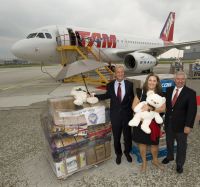 AIRBUS has delivered its 4,000th A320 series family aircraft, an A319 to Brazilian carrier TAM. The aircraft was handed over at Airbus Hamburg assembly factory in the presence of the President of the Board of TAM, Maria Claudia Oliveira Amaro, as well as Airbus President and CEO, Tom Enders. On the aircraft’s ferry flight to Brazil it will carry a special consignment of equipment for handicapped children. The first A320 made its maiden flight in February 1987 and was introduced into airline service in March the following year. The A320 family now includes the A318, A319, A320 and A321 and is now in service with 221 customers worldwide. www.airbus.com
AIRBUS has delivered its 4,000th A320 series family aircraft, an A319 to Brazilian carrier TAM. The aircraft was handed over at Airbus Hamburg assembly factory in the presence of the President of the Board of TAM, Maria Claudia Oliveira Amaro, as well as Airbus President and CEO, Tom Enders. On the aircraft’s ferry flight to Brazil it will carry a special consignment of equipment for handicapped children. The first A320 made its maiden flight in February 1987 and was introduced into airline service in March the following year. The A320 family now includes the A318, A319, A320 and A321 and is now in service with 221 customers worldwide. www.airbus.com
Bendy buses going
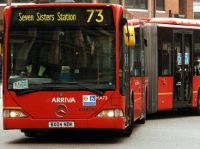 LONDON will see the demise of its much criticised ‘bendy buses’ over the next two years as they are progressively withdrawn from the route network. As predicted they proved to be impractical bearing in mind the narrowness of many major thoroughfares in the capital. The first to go, last week, was the 521, which operates between Waterloo and London Bridge replaced by a single decker. Transport for London (TfL) claims passengers will now see more buses on that route with a bus running every two or three minutes at peak times, rather than the current four-minute service. Route 38 will be the next to lose bendy buses later this year, after which there will be just nine routes left to convert before the end of 2011. www.tfl.gov.uk
LONDON will see the demise of its much criticised ‘bendy buses’ over the next two years as they are progressively withdrawn from the route network. As predicted they proved to be impractical bearing in mind the narrowness of many major thoroughfares in the capital. The first to go, last week, was the 521, which operates between Waterloo and London Bridge replaced by a single decker. Transport for London (TfL) claims passengers will now see more buses on that route with a bus running every two or three minutes at peak times, rather than the current four-minute service. Route 38 will be the next to lose bendy buses later this year, after which there will be just nine routes left to convert before the end of 2011. www.tfl.gov.uk
Bombardier C Series update
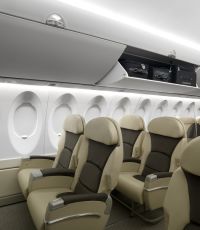 BOMBARDIER C SERIES, rival to the smaller Airbus 320 series and Boeing 737 “next generation” aircraft, is progressing on time with a scheduled for service date set for 2013. The first major test module, a fuselage trial barrel, has been delivered to Bombardier's Saint-Laurent, Quebec, facility from Shenyang Aircraft Corporation of China. Just over 10% of the C Series aircraft will be manufactured in China by Shenyang Aircraft Corporation. Another recent achievement for the C Series aircraft programme included the successful completion of a series of wind tunnel tests covering high speed, low speed and high lift. These were carried out at various facilities including, ONERA F1 (Toulouse, France), ETW (Cologne, Germany) and ARA (Bedford, UK). To date Bombardier has announced orders for 50 aircraft. www.bombardier.com
BOMBARDIER C SERIES, rival to the smaller Airbus 320 series and Boeing 737 “next generation” aircraft, is progressing on time with a scheduled for service date set for 2013. The first major test module, a fuselage trial barrel, has been delivered to Bombardier's Saint-Laurent, Quebec, facility from Shenyang Aircraft Corporation of China. Just over 10% of the C Series aircraft will be manufactured in China by Shenyang Aircraft Corporation. Another recent achievement for the C Series aircraft programme included the successful completion of a series of wind tunnel tests covering high speed, low speed and high lift. These were carried out at various facilities including, ONERA F1 (Toulouse, France), ETW (Cologne, Germany) and ARA (Bedford, UK). To date Bombardier has announced orders for 50 aircraft. www.bombardier.com
easyJet still at Luton
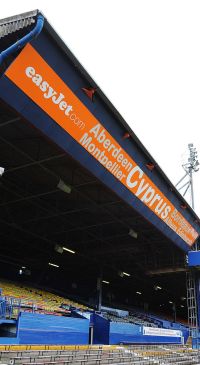 EASYJET, in a long and wordy document justifying events, has confirmed that it is to close its East Midlands (EMA) operation and reduce flying at Luton by 20%. The airline says it will move capacity to more profitable airports and expects that most of the aircraft will be redeployed to continental European bases. At the same time it confirmed an increase of August traffic numbers over the same period last year of 4.7% and says for the 12 months to 30 September 2009 it will deliver underlying pre-tax profit in the range of £25m to £50m. easyJet claims that the EMA operation has remained static for a number of years. With regard to Luton, the airline’s home base, two factors prevail. Firstly the cost of operating at the airport which the carrier claims has risen by 25% over the last three years, and secondly the dramatic rise in Airport Passenger Duty (APD), which is affecting traffic. Both the operator, Spanish company Abertis, and the airport owner Luton Borough Council, come in for criticism from the airline. www.easyjet.com
EASYJET, in a long and wordy document justifying events, has confirmed that it is to close its East Midlands (EMA) operation and reduce flying at Luton by 20%. The airline says it will move capacity to more profitable airports and expects that most of the aircraft will be redeployed to continental European bases. At the same time it confirmed an increase of August traffic numbers over the same period last year of 4.7% and says for the 12 months to 30 September 2009 it will deliver underlying pre-tax profit in the range of £25m to £50m. easyJet claims that the EMA operation has remained static for a number of years. With regard to Luton, the airline’s home base, two factors prevail. Firstly the cost of operating at the airport which the carrier claims has risen by 25% over the last three years, and secondly the dramatic rise in Airport Passenger Duty (APD), which is affecting traffic. Both the operator, Spanish company Abertis, and the airport owner Luton Borough Council, come in for criticism from the airline. www.easyjet.com
In-flight internet
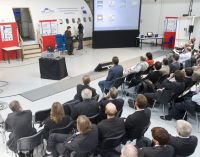 IN-FLIGHT INTERNET using 3G (third generation) has been demonstrated by TriaGnoSys, an expert in satellite communications, to a group of leading European airlines, airports, manufacturers and service providers at the Airbus Cabin Test Centre in Hamburg, as part of the final stage of the ground-breaking E-Cab project. The services provide a range of passenger and crew communications applications, and the communications manager controls all satellite-based passenger, cabin crew and IFE data communications to and from the aircraft during flights. 3G is said to provide a faster, quicker and cheaper answer to providing internet connectivity. www.triagnosys.com www.e-cab.eu
IN-FLIGHT INTERNET using 3G (third generation) has been demonstrated by TriaGnoSys, an expert in satellite communications, to a group of leading European airlines, airports, manufacturers and service providers at the Airbus Cabin Test Centre in Hamburg, as part of the final stage of the ground-breaking E-Cab project. The services provide a range of passenger and crew communications applications, and the communications manager controls all satellite-based passenger, cabin crew and IFE data communications to and from the aircraft during flights. 3G is said to provide a faster, quicker and cheaper answer to providing internet connectivity. www.triagnosys.com www.e-cab.eu
San Francisco Airport hotel
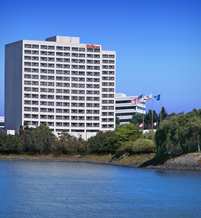 HILTON SAN FRANCISCO AIRPORT is the new name of the of the refurbished Sheraton Gateway. Bordering the San Francisco Bay, the hotel is three miles from the airport and about 15 miles from downtown ‘Frisco. It offers 400 rooms featuring the GuestLink system, which includes a 42-inch flat-screen HDTV multi-media monitor allowing guests to plug in digital devices such as a laptop computer, game station console, video/camera or iPod. The property has 11 function rooms with flexible meeting space, complimentary wi-fi hotspots in the lobby and public areas, and a 24-hour business centre. With the hotel’s fitness centre set to be upgraded to a Hilton Fitness by Precor facility, the hotel will also include jogging and bike paths, nearby golf and tennis facilities, and indoor heated swimming pool. It offers complimentary shuttle service to and from the San Francisco Airport and a courtesy shuttle to BART (light rail) for services to San Francisco and other Bay Area destinations. www.hilton.com
HILTON SAN FRANCISCO AIRPORT is the new name of the of the refurbished Sheraton Gateway. Bordering the San Francisco Bay, the hotel is three miles from the airport and about 15 miles from downtown ‘Frisco. It offers 400 rooms featuring the GuestLink system, which includes a 42-inch flat-screen HDTV multi-media monitor allowing guests to plug in digital devices such as a laptop computer, game station console, video/camera or iPod. The property has 11 function rooms with flexible meeting space, complimentary wi-fi hotspots in the lobby and public areas, and a 24-hour business centre. With the hotel’s fitness centre set to be upgraded to a Hilton Fitness by Precor facility, the hotel will also include jogging and bike paths, nearby golf and tennis facilities, and indoor heated swimming pool. It offers complimentary shuttle service to and from the San Francisco Airport and a courtesy shuttle to BART (light rail) for services to San Francisco and other Bay Area destinations. www.hilton.com
United Airlines money move
 UNITED AIRLINES is to accept only credit and debit cards for most onboard purchases on transatlantic flights and on flights to and from Brazil and Argentina. To speed cabin service, provide receipts and increase efficiency, cash will no longer be accepted onboard these flights, except for duty-free purchases. United introduced the popular EasyPurchase initiative worldwide in March, and ceased accepting cash in April on flights within the United States (including Hawaii) and on flights to and from Canada, Mexico, Central America and the Caribbean. Feedback provided by thousands of customers in online surveys demonstrated wide acceptance for a cash-free environment. All major cards are accepted. United will continue to accept cash in addition to credit and debit cards on flights to and from Asia. www.united.com
UNITED AIRLINES is to accept only credit and debit cards for most onboard purchases on transatlantic flights and on flights to and from Brazil and Argentina. To speed cabin service, provide receipts and increase efficiency, cash will no longer be accepted onboard these flights, except for duty-free purchases. United introduced the popular EasyPurchase initiative worldwide in March, and ceased accepting cash in April on flights within the United States (including Hawaii) and on flights to and from Canada, Mexico, Central America and the Caribbean. Feedback provided by thousands of customers in online surveys demonstrated wide acceptance for a cash-free environment. All major cards are accepted. United will continue to accept cash in addition to credit and debit cards on flights to and from Asia. www.united.com
ON TOUR: The Road to Morocco
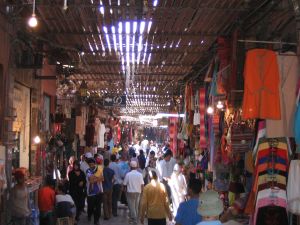 “'We certainly do get around.
“'We certainly do get around.
Like Webster's Dictionary we're Morocco bound.”
That was Bing Crosby singing in 1942. The “Road to Morocco” was one of the most popular of the Road series films which also included Bob Hope and Dorothy Lamour.
Things have changed. But not that much.
Let’s do the negative first.
The taxi drivers look like US State Department photo-fits of terrorist suspects, but don’t get alarmed.
And on the positive front King Mohammed VI, like his late father Hassan, is a friend of the West and his subjects love him. He is a golf fan.
About Morocco Just as close to Luton Airport as Athens, and a lot nearer than Tenerife, Marrakesh is as far removed from the UK as Lhasa, Lima or Luanda. Morocco's most tourist-filled but traditional city contradicts in itself on every street corner to the western eye. These are not reasons not to go, but compelling reasons to go. The place, the people and the culture are far more accessible than you imagine.
Just as close to Luton Airport as Athens, and a lot nearer than Tenerife, Marrakesh is as far removed from the UK as Lhasa, Lima or Luanda. Morocco's most tourist-filled but traditional city contradicts in itself on every street corner to the western eye. These are not reasons not to go, but compelling reasons to go. The place, the people and the culture are far more accessible than you imagine.
Marrakesh is suited for a weekend and also offers ample sights and sounds to keep visitors busy for a week or longer, if you wish to trek or even ski in the Atlas Mountains. The climate offers enough sun to satisfy ardent sunbathers throughout our damp spring and autumn months, but given that summer temperatures hit 50ºC, the peak season is the cool but not cold Christmas and New Year. Thinking of hiring a car? Think again, in this part of the world, off-road is probably safer than on-road.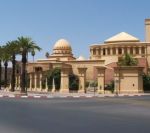 Getting there has never been easier. Marrakesh has had much investment with a modern travel infrastructure, a new railway station, airport terminal and a motorway is under construction to Morocco's other key tourist destination, the Atlantic beaches of Agadir. The capital Rabat and commercial centre Casablanca are now only a three-hour train ride away and Marrakesh's Menara Airport, which is amply served from the UK by scheduled, charter and low cost airlines, has to be the most downtown of all airports in the Ryanair network, just a ten-minute taxi or coach ride into the city centre. It is actually where it says it is!
Getting there has never been easier. Marrakesh has had much investment with a modern travel infrastructure, a new railway station, airport terminal and a motorway is under construction to Morocco's other key tourist destination, the Atlantic beaches of Agadir. The capital Rabat and commercial centre Casablanca are now only a three-hour train ride away and Marrakesh's Menara Airport, which is amply served from the UK by scheduled, charter and low cost airlines, has to be the most downtown of all airports in the Ryanair network, just a ten-minute taxi or coach ride into the city centre. It is actually where it says it is!
Marrakesh covers the cultures Over the last decade the city’s tourist accommodation has expanded dramatically. At the top end is Marrakesh's iconic Mamounia hotel, a favoured halt of Winston Churchill, Yves Saint Laurent (and my mother-in-law), which will re-open on 29 September after three years of renovation. For the first time ever, The Mamounia will have competition at the top end of the market from Lucien Barrière's Naoura. The luxury hotel group also owns a casino and racecourse, and this is their first venture outside France.
Over the last decade the city’s tourist accommodation has expanded dramatically. At the top end is Marrakesh's iconic Mamounia hotel, a favoured halt of Winston Churchill, Yves Saint Laurent (and my mother-in-law), which will re-open on 29 September after three years of renovation. For the first time ever, The Mamounia will have competition at the top end of the market from Lucien Barrière's Naoura. The luxury hotel group also owns a casino and racecourse, and this is their first venture outside France.
To get a taste of the city avoid the few real and the many less real five-star hotels grouped around the city and in the Palm Grove to the North, and head to the "Medina", the old walled town. This complex of narrow man, moped and mule packed streets is filled with the bustle and chaos that represents a centuries' old way of life. A street map is a necessity here, but may not actually be useful.
As well as its maze of streets the Medina is a bewildering complex of doorways, and behind many lies an adventure. It could be a palace, art gallery, carpenter's workshop, mosque or even the synagogue. Similarly a stairway can lead to a ruin or a lavish roof top restaurant. In the media, tourists quickly learn not to judge a book by its cover. The old city is complex and a Sat Nav is not an option. 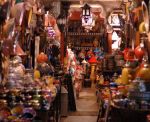 Behind many doors you will find Riads (private houses), converted to restaurants or small hotels, some simple, many luxurious, but all hidden away from the non-stop activity outside. Service can sometimes be slow, this is not rude or a lack of attention, that's just the way it is. The best are real oases of cool, calm and charm. Fitting of this description is the Riad Chergui. Picked out by some UK broadsheets a few years ago as one of the top ten places to stay in Marrakesh, it probably still is.
Behind many doors you will find Riads (private houses), converted to restaurants or small hotels, some simple, many luxurious, but all hidden away from the non-stop activity outside. Service can sometimes be slow, this is not rude or a lack of attention, that's just the way it is. The best are real oases of cool, calm and charm. Fitting of this description is the Riad Chergui. Picked out by some UK broadsheets a few years ago as one of the top ten places to stay in Marrakesh, it probably still is.
Chickens and ducks
The Medina culminates in the main square of Djemaa El Fna with its snake charmers, acrobats, story tellers, musicians and food stalls. This is not Disneyland but a real living culinary and performance culture, an increasing rarity and a privilege even for seasoned travellers. Butchers seem to abound in the bustle. They look exactly that, and every part of a sheep is used, from head to toe and everything in between (especially in the case of the males). Perhaps it is not too hygienic but people survive. Chickens and ducks run around.
If you stay for a day or a month no visit to Marrakesh is complete without one 'square meal' in Djemaa El Fna. Go to where the locals are queuing and you will not be disappointed. Depending on your appetite you may have to move around a bit to get a full meal as each stall specializes. However no feast is complete without a 25p bowl of Harria or Chorba soup to start and a 25p glass of fresh orange juice to finish. 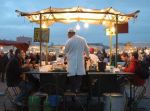 The other 'must do' in the Medina are the souks, given exposure in the last of Alan Sugar's "The Apprentice" series, when the UK's favourite business guru described the business acumen of the souk traders as "the best in the world" he warned his apprentices.
The other 'must do' in the Medina are the souks, given exposure in the last of Alan Sugar's "The Apprentice" series, when the UK's favourite business guru described the business acumen of the souk traders as "the best in the world" he warned his apprentices.
In your hunt is for the perfect souvenir from Marrakesh's traditional leather, metal, ceramic, jewellery or wood artisans, AERBT's hint is to go to the fixed price government run "Ensemble Artisantal" near the Town Hall before venturing into the souk. You will then get an idea of what the real price should be, and you can enjoy your bargaining and in true Mr Bean style bring back at least one piece of Morocco for your mantle piece.
Marrakesh may not be for everyone, but it is fun.
HOWARD DAVIS


